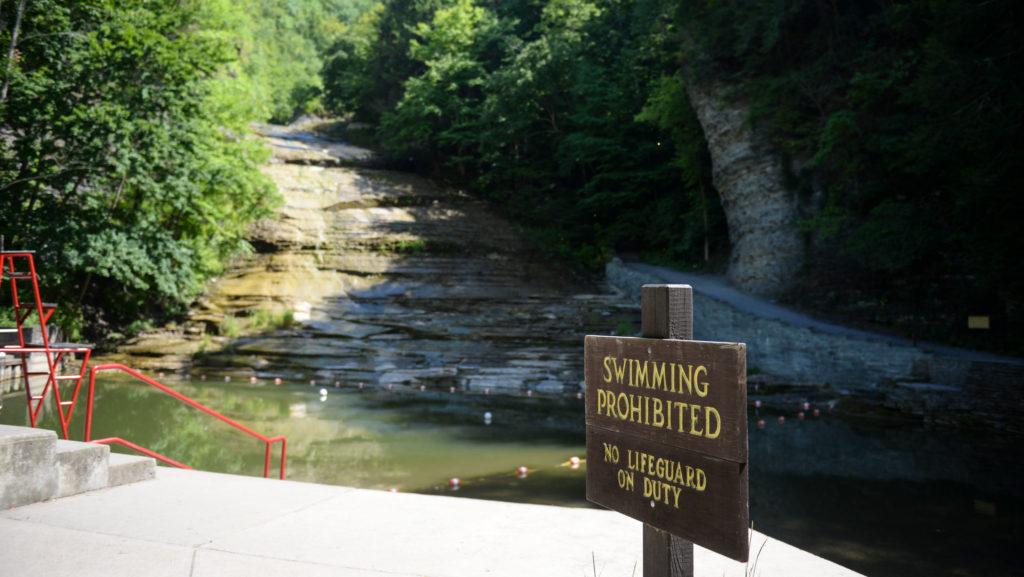The City of Ithaca employed rangers to patrol the dams along Six Mile Creek this summer and enforce swimming and cliff jumping bans. Despite the pilot program, city officials said it has only had marginal success in enforcing rules and that violations are increasing as Ithaca College students return to school.
For safety reasons, visitors at the gorges are not allowed to swim, jump or consume alcohol in the city’s dams, as there have been injuries and deaths in the past. To tighten enforcement of these laws, the city hired four rangers in May to patrol First, Second and Third Dams along Six Mile Creek, Julie Conley Holcomb, City of Ithaca clerk, said. The patrols will continue through September to disperse large crowds that gather to swim, mitigate drug and alcohol use and address safety issues.
“Our goals are to stop people from doing incredibly dangerous behaviors that can result in personal injury and-or death,” Holcomb said.
Holcomb said she thinks the rangers, which patrol from noon to 8 p.m. seven days a week, have made a difference in terms of crowd reduction and enforcing voluntary compliance. Law enforcement has only had to give out 15-20 tickets for noncompliance, which Holcomb said is a low number, though she does not have data from previous years. However, there are still problems with graffiti, trash, alcohol and cliff jumping, and she said these incidents have been increasing since the semester began.
“We have noticed an uptick in that type of activity since the Ithaca College students have returned to school, and it has been a little problematic,” Holcomb said. “We’ve noticed a lot more trash, larger crowds, crowds that are not reacting well to the gorge rangers’ instructions.”
She also said people are still getting hurt, though there have been fewer injuries than in past years. The most severe injury they have seen at one of the gorges this summer was a broken ankle after someone jumped into the water, Holcomb said.
In order to combat the recent increase in violations, she said the city is looking to work with administrators at the college to create education programs about gorge safety; however, nothing has been implemented yet. In the meantime, a task force charged by Mayor Svante Myrick is working on studying the gorges to see how legislation and rules can be changed, what activities can be allowed in the gorges and how to enforce them, Holcomb said. She said any changes for 2017 will come from this task force.
Jeanne Grace, an Ithaca City forester, said she thinks the program had more success toward the beginning of the summer, but after protests regarding the restrictions occurred at Town Hall, more people decided to ignore the rules. She said city officials want the same thing as the protestors — a beautiful, natural area. But she said without the rules being enforced, that won’t be a reality.
“We want a free, natural area people can enjoy,” Grace said. “And I think when we let these big groups congregate and we have dangerous activity, we have alcohol consumption and other things, that we don’t want in the natural areas.”
Junior Elena Haskins worked at the college over the summer and said she visited the gorges often. She said she did not see any rangers during her many visits, and people continued to jump from the cliffs and swim.
She agrees with the city officials that jumping and swimming can be dangerous, but she said she does not think rangers will help students understand the dangers they face. She said she would prefer alternative safety education, which is something Holcomb said a newly created task force is working on creating.
“When a group of young people see patrols … they correlate them with getting in trouble, with the law, and no one wants that on their record,” Haskins said.
Holcomb said her goals for next year include creating better signage that clearly states what gorge visitors can or cannot do, and to work on ways to better educate the public about safety issues. Grace said the number of rangers will increase as well.
“For the first year of the enhanced program … we have made progress, but we still have a long ways to go,” Holcomb said. “It’s going to take a few years to change the culture in those areas.”








